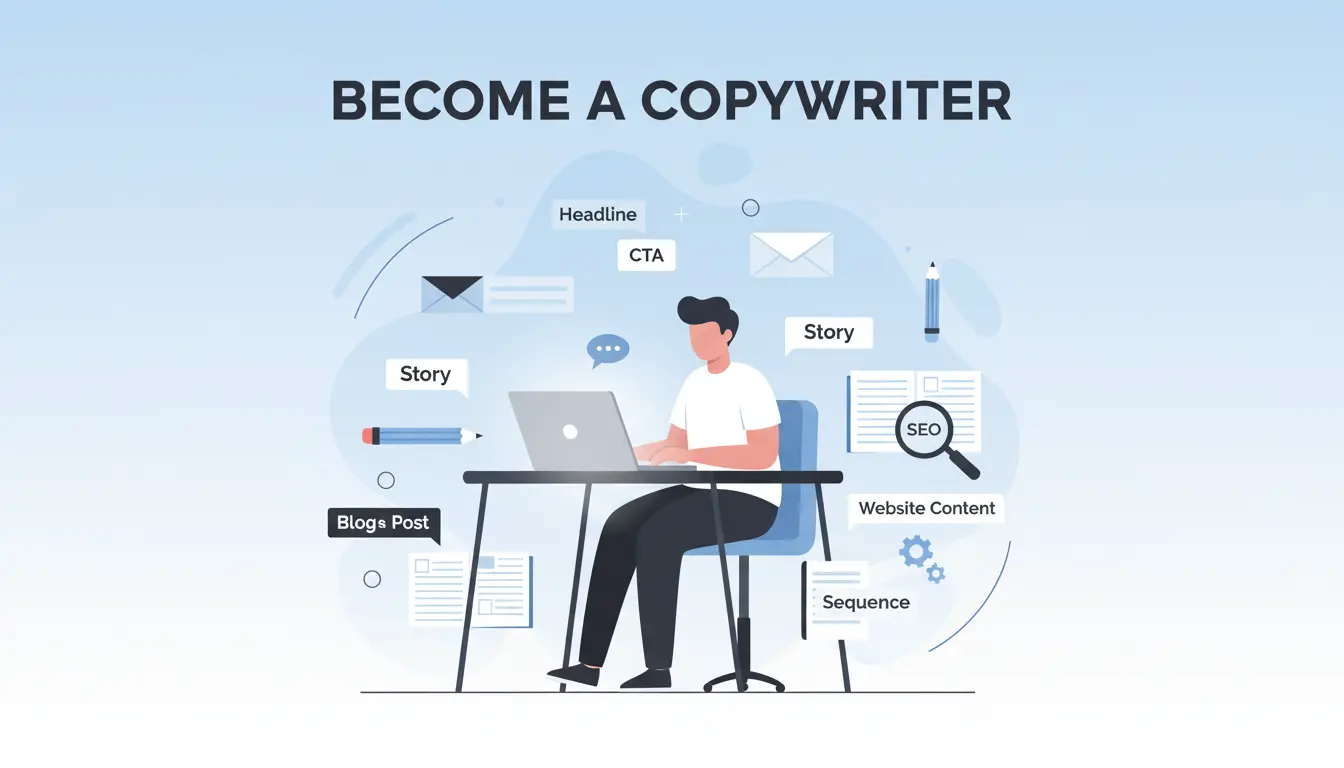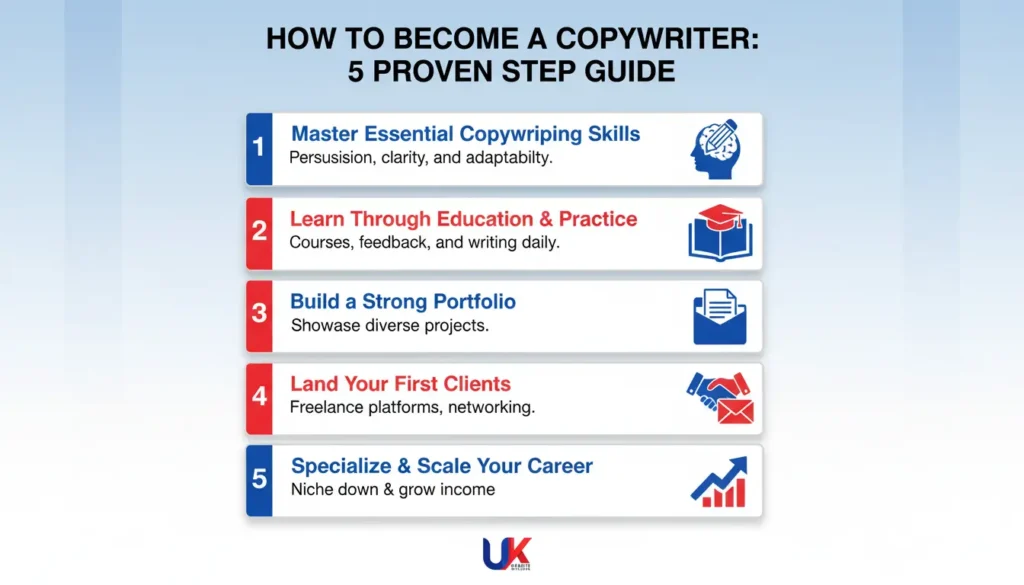Check out
3 Powerful Roles an SEO Copywriter Plays for SuccessEvery day, thousands of would-be authors inquire about how to become a copywriter, and learning this skill has never been easier. Whether the goal is to engage an audience, increase brand awareness, or close a deal, copywriting blends strategy and creativity to create messages that are compelling and motivate action. Being a freelance copywriter offers a flexible path where talent, perseverance, and strategic learning can open doors faster than expected, in contrast to traditional writing careers that frequently require years of formal education.
Copywriting was once a specialized advertising skill, but the digital revolution has made it one of the most sought-after careers in a variety of industries. Persuasive content is essential for websites, emails, social media, ads, and more for companies of all sizes. The tried-and-true five-step process that takes novices from having no experience to acquiring their first paying clients, developing a solid portfolio, and starting a successful copywriting career is broken down in this guide.

Before diving into the detailed roadmap, here’s what aspiring copywriters need to know about breaking into this field:
Key areas included:
Understanding what does a copywriter do is essential before embarking on this career path. With specific goals in mind, copywriters produce written content intended to engage, educate, or persuade particular audiences. Writing memorable slogans is only one aspect of the job; creating messages that produce quantifiable outcomes requires knowledge of consumer psychology, market research, and brand storytelling.
The daily tasks performed by copywriters vary depending on their area of expertise and type of job. While some specialize in creating landing pages that turn visitors into customers, others concentrate on creating persuasive advertisements for advertising agencies. Experts in social media copywriting produce interesting posts that foster community and increase engagement, while email copywriting craft captivating newsletters and sales sequences. All of these positions have one thing in common: writing that persuades readers to take particular actions.
Beginners frequently become confused by the difference between copywriting vs content writing. While copywriting prioritizes persuasion and conversion, content writing usually concentrates on educating and informing audiences through blog posts, articles, and guides. But contemporary digital marketing frequently combines the two, necessitating that experts become proficient in a variety of writing styles and methods.
Learning the fundamental copywriting skills that set great persuaders apart from mediocre writers is the first step in becoming a copywriter. These skills determine how quickly novices can draw in copywriting clients and are the cornerstone of any successful copywriting career.
The foundation of all copywriting is persuasive writing. This ability requires knowledge of decision-making processes, emotional triggers, and human psychology. In order to create messages that connect with target audiences and motivate them to take desired actions, skilled copywriters research copywriting psychology. Another crucial ability is creating captivating headlines, which draw attention in crowded digital spaces and influence whether or not readers continue reading the content.
Creative writing skills complement the technical aspects of copywriting by adding originality and personality to marketing messages. Even though marketing copywriting adheres to tried-and-true frameworks and formulas, the most memorable campaigns use creativity to set brands apart. Furthermore, knowing SEO copywriting guidelines guarantees that written content is readable and persuasive while ranking highly in search results.
Strategic learning speeds up the process of learning how to begin copywriting, even though formal education is not necessary. Numerous resources exist for those wanting to learn copywriting, from free online content to comprehensive copywriting courses and copywriting certification programs.
Copywriting for beginners should begin with foundational books and courses that teach tried-and-true concepts. Persuasion strategies, consumer psychology, and creating formulas that have produced billions in sales are all covered in classic texts. Practical assignments, expert feedback, and real-world copywriting examples that showcase successful strategies across various industries and formats are common components of contemporary copywriting training programs.
Copywriting mentorship offers priceless advice that speeds up skill development. Beginners can avoid common copywriting errors and gain an understanding of industry nuances that are rarely covered in books by learning directly from seasoned professionals. Many accomplished copywriters credit their development to mentors who offered candid criticism, industry contacts, and useful copywriting tips derived from actual client experiences.
Copywriting practice through actual or simulated projects develops competence; theory by itself does not produce competent copywriters. Rewriting already-existing ads, developing spec campaigns for preferred brands, and finishing daily writing assignments that test various abilities are all recommended for beginners.
No email required. Instant download. Start your copywriting journey today!
The most important step in how to become a copywriter is building a solid copywriting portfolio. The main resource for landing copywriting jobs is this compilation of work samples, which showcase abilities to prospective clients.
Creating spec work, or unpaid samples written for actual or hypothetical clients, is necessary to building a copywriting portfolio without experience. Copywriting examples for beginners should be created in a variety of formats, such as landing pages, emails, ads, and website copy. Focus on producing five to ten outstanding pieces rather than dozens of mediocre samples because quality is far more important than quantity.
Every portfolio item should demonstrate a variety of copywriting skills and styles. Provide a variety of copywriting samples that show adaptability to different industries, goals, and tones. While one piece might demonstrate email copywriting skills with a comprehensive sales sequence, another might highlight headline writing skills with an engaging advertising campaign. Samples of social media copywriting show mastery of succinct, captivating content, while longer-form works show the capacity to hold readers’ attention through intricate landing pages or sales letters.
Landing your first copywriting client can seem like the hardest obstacle to overcome, but there are a number of tried-and-true methods that help newbies land their first jobs. It takes a combination of outreach, strategic positioning, and perseverance to understand how to find copywriting work.
One of the best strategies for novice freelance copywriters is still cold pitching clients. This strategy entails determining which companies would profit from better copy, examining their present marketing collateral, and contacting them with detailed improvement recommendations. Successful cold pitches show prospective copywriting clients how improved copy could improve their results by demonstrating value before requesting anything in return.
Copywriting jobs can also be found through a variety of channels and platforms. Copywriters can now work with clients all over the world thanks to the growing popularity of remote copywriting jobs. Both contractors and employees are hired by copywriting agencies, which offer reliable work and worthwhile experience. Although there can be fierce competition and low initial rates, freelance marketplaces link novices with companies in need of copywriting services.
Instead of continuing to be a generalist, focus on particular copywriting niches to become a successful copywriter. Professionals who specialize can command higher fees, establish themselves as authorities, and draw in higher caliber copywriting clients who respect specialized expertise.
B2B services, technology, e-commerce, health and wellness, and finance are among the most popular copywriting niches. As companies place a greater emphasis on search visibility, SEO copywriting is another useful specialty. Because successful email campaigns directly affect revenue, email copywriting experts command high rates. Choosing a niche that fits both market demand and individual interests is crucial.
Copywriting career path options extend far beyond basic freelancing. Senior positions at copywriting agencies, positions as copywriting directors at businesses, or agency ownership are all options for seasoned professionals. Successful copywriters sometimes go on to work in related industries like brand storytelling consulting or digital marketing strategy.
Highly successful copywriters are distinguished from mediocre ones by their constant improvement. Studying fresh copywriting examples, keeping up with AI copywriting tools and market developments, and routinely upgrading abilities through advanced copywriting training are all part of this. Copywriting abilities are kept current and sharp through reading trade journals, evaluating effective campaigns, and experimenting with various strategies.
Beginners can accelerate their development and steer clear of setbacks that derail many aspiring professionals by learning from their copywriting errors. A more straightforward route to success is created by being aware of these typical pitfalls.

Career Path | Income Potential | Flexibility | Skills Required |
|---|---|---|---|
Freelance Copywriter | $30K – $150K+ annually | High – set own schedule and choose clients | Self-discipline, business management, diverse writing styles |
In-House Copywriter | $45K – $90K annually | Medium – standard employment benefits | Team collaboration, brand consistency, deadline management |
Agency Copywriter | $40K – $100K annually | Medium – structured environment with variety | Fast turnaround, multiple client voices, creative brainstorming |
Specialized Copywriter (SEO/Email/Technical) | $60K – $200K+ annually | High – premium rates for expertise | Deep niche knowledge, technical skills, proven results |
Content Marketing Manager | $55K – $120K annually | Medium – strategic leadership role | Strategy development, team management, analytics interpretation |
Since the industry prioritizes demonstrated skills over credentials, anyone can become a copywriter without any prior experience. Start with smaller projects, concentrate on copywriting for beginners resources, and develop a portfolio of spec work.
Creating compelling content that advances corporate goals is what a copywriter does. This covers copywriting for emails, landing pages, social media, and ads that blend strategy and creative writing.
Yes, with businesses depending on digital marketing, copywriting is in high demand. Particularly for SEO copywriting experts, the growth of e-commerce has led to a large number of remote copywriting jobs.
The journey of how to become a copywriter offers tremendous opportunity for those willing to invest time in developing copywriting skills and building a strong professional foundation. Copywriting rewards skill, commitment, and strategic learning regardless of background, in contrast to many other professions that demand a high level of formal education. Mastering fundamental skills, pursuing education and practice, developing a strong portfolio, acquiring initial clients, and specializing for growth are the five tried-and-true steps described in this guide that offer a clear path to success.
Both traditional and freelance copywriting careers offer fulfilling career paths with high earning potential and creative fulfillment. The secret is to act consistently, learn from both achievements and errors, and keep honing your craft by regularly practicing and studying successful copywriting examples. Whether you want to start your own business, collaborate with copywriting firms,